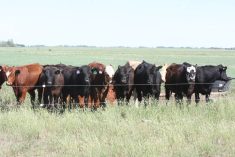RED DEER — Jim Chatenay says some days he feels like his arms are nine feet long.
Pulled in one direction by Canadian Wheat Board obligations and another by the demands of his constituents in southern Alberta’s District 2, the CWB director has vowed to continue his crusade for a reformed wheat board.
“We’re trapped in a system we can’t get away from,” he told about 250 people at a district meeting in Red Deer.
By promoting a voluntary wheat board, Chatenay said he was returned to the board of directors with a secure mandate to stay on course.
Read Also

Alberta Beef Producers announces withdrawal from Canadian Cattle Association
Glacier FarmMedia – On August 12, 2025, the Alberta Beef Producers (ABP) announced their decision to withdraw their membership from…
He said farmer pressure is growing for continued reform and if it does not happen, the board could become extinct. He has a four pronged approach to reform:
- The board should offer a 10 percent exemption across the wheat board’s designated region. It could accommodate small markets like organic grain producers who resent the buy back program, which they claim cuts into their profits. The exemption could be similar to what is offered by the Ontario Wheat Producers Marketing Board.
- Limit the wheat board monopoly to export sales only.
- District 2 should be removed from the board’s jurisdiction for three years to test a voluntary system. District 2 is a major barley growing area with a number of marketing options, including the massive livestock industry and its voracious appetite for feed.
- Export licences should be issued free of charge on request.
Organic industry
Organic grain producer Steve Snider, considers these requests reasonable.
Snider, who farms near New Norway, Alta., was involved in consultations with the board last year, but came away frustrated.
When he sells his grain into the United States, he must first obtain an export permit and buy back the grain. He wants no-cost licences for organic growers.
Snider said the buy back and payment of an administration fee to the board for an organic sale earned him only 20 cents a bushel over the market price for conventional wheat on Jan. 18.
Organic producers tend to work on a spot market and if an offer to buy comes in, they must react quickly.
“If I don’t move, I lose the sale,” he said.















